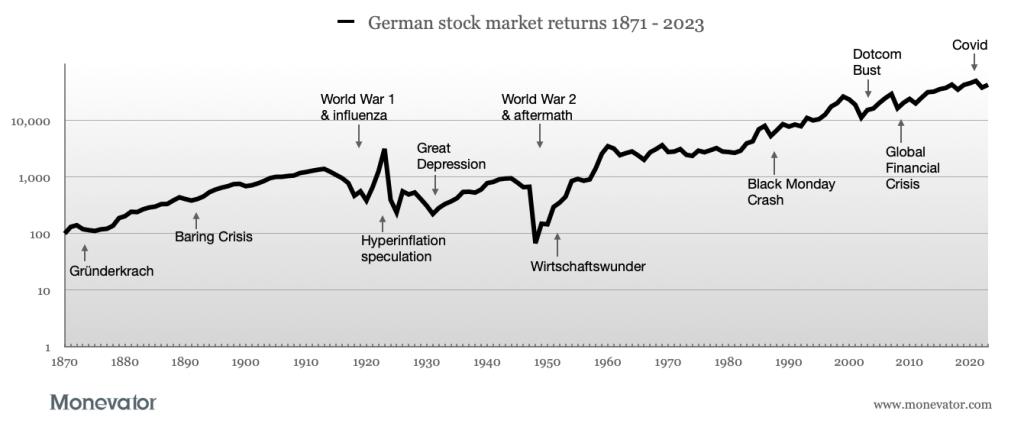
Every day you live, your life expectancy increases by six hours. Incredible, eh?
That statistic comes courtesy of Duke University. The academics got it from playing around with nearly two centuries of life expectancy data.
According to Professor James Vaupel:
“If young people realize they might live past 100 and be in good shape to 90 or 95, it might make more sense to mix education, work and child-rearing across more years of life instead of devoting the first two decades exclusively to education, the next three or four decades to career and parenting, and the last four solely to leisure.”
(Nobody tell him about the FIRE movement! He’ll have an early heart attack.)
Vaupel also contributed to a study published in The Lancet in late 2009 that found that on then-current trends, more than 50 per cent of babies born after the year 2000 in the developed world would see their 100th birthday.
Great news for little Jimmy. But what does it mean for us investors?
Well, it’s one thing to eat well in order to get to old age with most of your teeth intact and a liver that’s fit for purpose.
But what will you be doing for spending money?
Stronger, faster, more productive
In my experience most people radically underestimate the lifespan that – touch wood – lies ahead of them.
I’m the gloomiest person I know. I pretty much assume the environment is going to be trashed, and that the male genes on my father’s side doom my own longevity.1
This is on top of knowing it will rain on bank holidays, that sequels to my favourite K-Dramas will be disappointing, and that I won’t win the lottery.
Yet despite this innate pessimism, I instinctively think long-term.
I keep fit because I want to be in reasonable shape in my 60s and 70s. As opposed to super-buff next week.
I’ve never been in non-mortgage debt. That’s because I know I’m only borrowing from my future self.
It’s also why I’ve found it easy to save. And probably why I tend to cope well with bear markets.
Thinking long-term is rarely the easy option. It would have been more fun to spend more on holidays in my 20s, for example, instead of saving quite so much.
I also think I’ve hurt some people in my life by weighting tomorrow so heavily. Particularly girlfriends, who despaired at my reluctance to settle down.
The thing is, marrying one person for life seems a stretch to me at any age. But at 25, when you might live until 100?
That seems – ahem – imprudent. If lifespan has doubled in the past two centuries, then surely our milestones should change, too?
Few people think this way. Especially not when we’re young. Indeed since the first go at this article in 2010 we’ve had the emergence of a lifestyle and acronym – FOMO – that’s pulling even more people in the opposite direction.
Yet if the proverbial bus was actually hitting people at the rate implied by the ‘tomorrow may never come’ brigade, then you wouldn’t be able to cross the street without getting whacked by flying bodies.
Agreed, you don’t want to be a tightwad. Nor make cast-iron plans to meet Miss or Master Right when you’re 60.
But life is increasingly long for most of us. Surely we should live – and invest – accordingly?
Age ain’t nothing but a number
Given the magic of compound interest, the reason we have a ‘pensions crisis’ as opposed to a ‘pensioner bonanza’ is because our existing State pension system is a Ponzi-scheme. It’s built on yesteryear’s maths of an expanding workforce and a small population of old folk who didn’t have the impudence to hang around for too long.
This is not a UK-only problem. Most of the developed world – even many emerging countries like China – face a similar game of demographic snakes and ladders.
Just consider the unrest in France recently. And they’re only attempting to hike the official retirement age from 62 to 64.
Solving this thorny problem is above our pay grades (and the pay grades of those we pay to have a crack, it seems.)
Rather, as the sort of self-reliant types who read Monevator, we need to take charge of our lives. To think about asset allocation and what our lengthening lives means for our retirement spending for ourselves.
To my mind that means owning more risky assets for longer than the old rules-of-thumb suggest.
Investing for 100-year olds: asset allocation
Let’s quickly get back to basics.
There are two main asset classes – equities and bonds. (Well, and cash, but that’s not a good long-term investment).
Through this reductive lens everything else is a short-term diversifier, redundant, or some variation of these two main classes. (E.g. a property REIT is a hybrid equity/bond and gold is almost a crappy growth stock.)
Equities versus bonds boils down to volatile and uncertain growth from shares, versus the (usually) steady and low but knowable return from bonds.
And we typically shift our holdings of these assets over time.
When we’re young, we can handle more volatility. That’s because we’ve plenty of time to bounce back, and we’re not drawing money out of our portfolio. Hence we can own a lot more equities since we don’t face a threat to our living standards from an unlucky sequence of returns. (Basically, the danger of the markets crashing and you having to sell too much to live on before they recover.)
On the other hand, when you’re old you have a shorter time horizon. Long-term growth is a fairy story you tell the grandchildren. You might never recover from a bear market crash with too much in equities.
For the elderly it’s mostly all about security of capital and income.
Old enough to know better
The difficulty – perhaps the hardest in investing – is the years in-between ‘young’ and ‘old’. The broad ‘middle-age’ that doesn’t just make you wonder if you should still be wearing skinny jeans in your mid-40s, but also whether you should start to take bonds more seriously.
Especially when, as I’ve said, that broad middle-age is expanding like the average Briton’s waistline.
Conventional wisdom is that you should vary your exposure to the two main assets according to your age, where:
100 – your age = your equity allocation
For instance, if you’re 60, you should have 40% of your assets in equities (100-60) and the rest in bonds.2
But does this ratio still make sense in a world where many pre-schoolers are innocently toddling towards the 22nd Century?
There’s obviously no definitive answer. But here’s a few things to think about.
Inflation is your enemy
This is the big one. People retiring on fixed payment annuities at 60 who live to 100 could live to see their fixed incomes ravaged as badly by inflation as arthritis does for their joints.
Inflation at just 3% will halve the purchasing power of your money in 23 years.
This is bad enough if you’re a single man, though some spending (though not care costs) might be expected to fall as you age.
But if you’re a 60-year old man with a 55-year old wife, she could really suffer if she outlives you by two decades.
Then again, the opposite could happen. Anything could happen! So we have to try to cover off what we can, while accepting some uncertainty.
Higher risk equals higher returns
All things being equal, if you’re going to live until 100 then for most of it you’d prefer to be mostly in equities rather than cash or bonds.
(The main exception being if you’re so rich that you don’t care if your money grows nowhere. In which case own a lot of inflation-protected bonds and short-term cash and have zero worries, at the cost of leaving a smaller legacy for your heirs.)
I’m not saying you should take more risk than you’re comfortable with. Nor that you shouldn’t have some non-equity assets to buoy your portfolio through various bleak scenarios.
But whether you need to pay for care at 80 or leave more to your great grandchildren at 103, you’ll likely have more to play with if you take on more risk – that is hold more equities for longer – for most of the journey.
Personally I’d aspire to leave them to wrest a good chunk of shares from your literally cold dead hands.
Income is more stable than capital values
Without a job to pay the bills, people are typically more concerned with income in their later years. And I’d note that dividend income can be more stable than fluctuating capital values.
It’s heresy to the passive investing purist, but I think there’s a decent case for owning well-established income investment trusts in your later years.
The trust’s share prices will still go all over the place. But the dividends paid do tend to rise year after year.
Note: I’m not claiming a free lunch here. Your total return will probably be less than you’d have gotten from the passive index fund equivalent, if only due to the manager’s fees. There also tends to be a big UK-bias in the equity income trust sector. That can work for or against you, but it’s contrary to best diversification practices.
However like this you’d be explicitly trading some risks for others. In my view, you’re principally reducing the risk of an uncertain income in exchange for taking on the strong risk of under-performing a global tracker.
You might need managing
Mental acuity sadly tends to decline with age. Trusts with long-standing dividend records may be better-placed to generate an annual income than you in your 90s, trying to sell down a global tracker fund in a bear market on a ten-year old laptop in a care home.
Equity risk is related to time in the market, not your age
If you’re 50, you’re statistically likely to live for at least 35 years, and maybe much longer. That’s enough time to ride more ups and downs of stock market volatility.
Don’t bet the farm, but equally don’t automatically assume you can’t hold plenty of shares once you’re 65. You could have several decades more of investing ahead of you.
More equities may mean you can save less
I’m not suggesting you should save less if you can afford to save more. But if you’re 57, money is tight, and you’re thinking of shuffling your money into bonds ahead of retirement at 67, perhaps you should pause.
In the worst case you might work a couple of extra years – or even live on baked beans – should equities slump.
But in brighter scenarios, you’ve still ten years to go. Over most ten-year periods, equities will beat bonds, thus doing more heavy lifting for you.
The number one priority is not to run out of money before you die. You can adjust by saving more or spending less – or by adjusting your exposure to riskier assets.
Not so shy and retiring
This is just my impression, but I think the sort of people who over-save for their retirement and read Monevator – higher-earning professionals – are generally much healthier in their mid-60s these days, compared to 30 years ago. (Certainly you’ll do yourself a big favour if you keep fit ahead of retirement.)
Meanwhile medical advances continue.
At the same time, younger people in their 20s and 30s are growing up assuming they’ll have multiple jobs, and perhaps even multiple careers. And our ageing population means that by the time they are the older workers, they will have less competition from young hotties.
There’s also the post-pandemic working from home shift. I think that plays in older workers’ favour, too.
All these factors mean the idea of earning at least some extra money in your old age – after officially retiring – could soon seem normal.
I’m a big fan of doing some paid work in retirement for myriad other financial, social, and emotional reasons too.
This all matters if you’re hoping to live for a century, because you can afford a riskier asset allocation if you’ve still got money coming in from elsewhere.
You can own more shares. And that – together with the benefit of earning extra spending money for longer – means you’re less likely to struggle for money if you do make it to 100.
Bound by bonds
Given amazing statistics such as half of today’s kids living to 100, it’s almost impossible to believe that the French are striking because their retirement age is rising to 64.3
It makes us Britons with our sky-high house prices and credit card addiction seem like hardheaded realists.
Yet we’re just as nutty. For decades our Government has compelled pension companies to hold more bonds and fewer equities. This, even as longevity moved ever further ahead.
I understand the logic and mathematics. Pensions are in the liability-matching business, the logic goes, not the wealth maximizing game.
But I also dispute it.
Pensions are also surely the ultimate long-term investment for most people, and most people are living longer.
As for regulators continuing to push this paradigm when bond yields spent nearly a decade on the floor, well, rather your portfolio than mine.
Bonds have a place in most portfolios, but people who live longer are optimists – and optimists should own shares.
Lottery stocks
Of course, if you’re an economic doomster type, all this talk of getting older and richer is academic. Equities will be made worthless by the coming collapse of civilization. Better gather ye rosebuds while ye may – before the Chinese buy them all, or the planet is cooked.
But the rest of us need to stretch our thinking by a couple of decades. Being old has some unavoidable drawbacks, but being old and poor compounds them.
Aim higher and who knows, maybe you’ll end up a rich old super-investor!
Finally, I should mention that life expectancy data has been getting cloudier in the past decade since that amazing statistic I opened with was first calculated.
Perhaps this is an artifact of the pandemic? Or maybe there’s something increasingly toxic about modern life.
However if I had to guess then I’d suggest the poor are living worse and dying younger, whereas the wealthy will continue to see longevity expand.
I don’t say that’s fair, obviously, and I vote accordingly. But I invest my money based on facts not feelings.
Still, nothing is guaranteed in this life. Your old age is not a fact – it’s an aspiration.
But so what if you’re one of the unlucky ones who gets hit by a bus, and you saved and invested for nothing? You either won’t know anyway – or you’ll have bigger things to think about.
In the meantime, you put yourself in the best possible position for the likeliest range of outcomes.
Still feeling FOMO because of the sacrifices you make? Perhaps focus on the greater security you feel from having a mini warchest at your back. A big stash can be a pleasure and a comfort in itself.
So no hard feelings if it was all for nowt. Money only buys so much happiness anyway.
That said, both my dad and his father had bad diets. Also the women in the generation before my parents all made it into their late 80s. Maybe there’s something to play for?True, sometimes you’ll see it as (120 – your age). This usually – and perhaps not coincidentally – happens whenever there’s a big bull stock market in play and everyone is keener on shares.Curiously, in the previous version of this article published in 2010 they were striking because their retirement age was rising to 62!
The post Investing for 100-year olds appeared first on Monevator.



